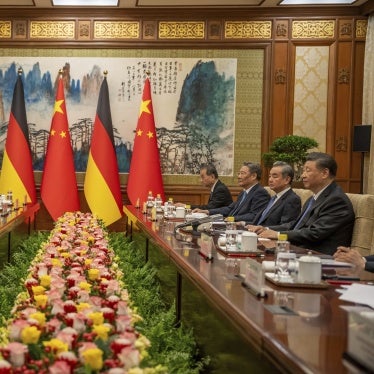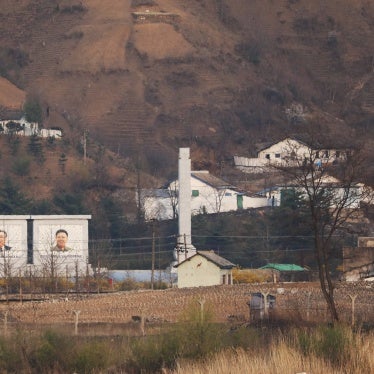The pro-democracy protests in the Middle East and North Africa have provoked China and Vietnam to crack down harshly on their dissidents lest they think they can emulate the "Jasmine Revolutions." But from North Korea, arguably the most repressive dictatorship in Asia, there continues to be nothing but radio silence. The silence doesn't mean everything is fine there, though. In fact, people are starving, and the situation is dire. It is hard to find the energy to protest when you are focused on survival.
Few in North Korea may even know of the changes taking place in other parts of the world. The regime of "Dear Leader" Kim Jong-il, like that of his father before him, operates with almost total censorship despite the efforts of North Korean exiles and others to smuggle in transistor radios and video CDs. The lack of information over many generations has led large numbers of citizens to believe that the Dear Leader is truly looking after their interests. Problems such as hunger and poverty are believed to be the fault of corrupt underlings.
Yet there are many North Koreans who no longer believe the big lie of the ruling Kim family's infallibility. The famine of the 1990s and the disastrous monetary "reform" in November 2009, which effectively demonetized most North Koreans' savings, have done away with many illusions. For the majority, the main reason they almost never protest in public is because the consequences are so dire. Public executions of those who cross the regime remain common. Forced-labor camps incarcerate entire families suspected of disloyalty to the regime. To protest in North Korea is an incredibly risky venture.
But once again, the people of North Korea are starving because of the mismanagement of the economy by the regime.
Mid-April was the start of the choongoong, the spring poverty season. That is when the last vestiges of the previous year's fall harvest are pretty much gone but the summer crops are not ready for harvesting. In recent years, North Korea has skated close to the edge as choongoong arrived, but this year it appears to have gone over the cliff.
World Food Program (WFP) analysts are warning that North Korea could face its worst food crisis since the famine of the 1990s that claimed more than 1 million lives. The WFP notes that severe weather and floods greatly impacted the 2010 fall harvest. An extremely cold winter gravely devastated winter wheat and potato production.
A recently completed United Nations food-security assessment conducted in February and March predicted a shortfall of more than a million metric tons of cereals. The North Korean government provided unusual access for the U.N. assessment. Four teams reached 40 counties in nine provinces over several weeks, entering provincial markets and state shops as well as private houses not preselected by the government, all of them previously out of bounds to international aid workers. International team members, including a fluent Korean speaker, were able to interview local people without the ubiquitous North Korean government minders in the room. One veteran WFP staff member not prone to hyperbole privately called it "the trip of a lifetime."
The question for donors is how to ensure that assistance reaches the people most in need. In this respect, the North Korean government is again its people's worst enemy. The domestic food-distribution system ensures first that the army, government functionaries and Workers Party loyalists receive adequate rations, followed by industrial workers. Vulnerable groups, such as the elderly and women and children, only come later - and they are the target groups for WFP-led food assistance.
The U.S. government and the international community should respond positively to the humanitarian imperative of resuming food assistance to North Korea, but they need to adopt a two-pronged approach. First, donors should insist that their aid go to vulnerable groups through the WFP and that its monitors can move, observe and report without restrictions to ensure that food aid is not diverted to the military, government officials or other privileged groups. This may be a tough negotiation because regime survival depends on special privileges and full stomachs for core supporters in the military and bureaucracy, but if the international community remains united, it can win the argument.
Second, donors need to insist that the recent improvements in access are made permanent. They should point out that freedom of movement for monitors will work as an early-warning system for future food shortages and enable earlier intervention, before hunger becomes widespread. As the Nobel laureate Amartya Sen concluded in his seminal book, "Poverty and Famines: An Essay on Entitlement and Deprivation," modern famines occur not only from a lack of food, but from inequalities built into food-distribution systems and the inability of the people affected to do anything about it.
It is the responsibility of both the Dear Leader and the international community to eradicate hunger in North Korea. Otherwise, the silence of the tomb will prevail for this and future springs in Pyongyang.
Phil Robertson is deputy director of Human Rights Watch's Asia division.







